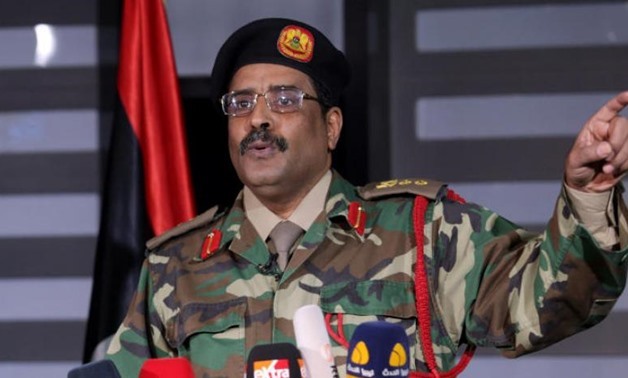
File: Libyan Army spokesman, Ahmed al-Mesmari
CAIRO – 22 January 2018: The Libyan army seems to have a hard job to do to maintain stability and security within the state shortly before holding the anticipated presidential and legislative elections during 2018, which will make the country finally have an elected consensual government and president after years of struggle and sufferings.
Libyan army spokesman Ahmed al-Mesmari revealed to Egypt Today in an interview on Monday a lot of details regarding some of the army’s operations and efforts to maintain the country’s stability, including the latest “Desert's Anger” military operation.
“We announced this operation to eliminate the terrorists based in the Kufra border city. Several terrorists moved from Sudan and Chad to relocate in the Libyan South, especially in Kufra. These terrorist groups made a lot of illegal practices, including stealing and abducting anything moving on the state’s borders with Egypt or Chad,” Mesmari said.
He added that these terrorist groups were started to move to reach other border cities with Egypt; however, launching the military operation banned these groups from expanding any further in the area, according to Mesmari. He explained that the borders between Egypt and Libya are long and wide, which makes it a kind of safe haven for arms and drugs smuggling, and that’s why the Desert's Anger military operation was needed urgently.
The operation succeeds to impose the Libyan army’s sovereignty over the southern area, as about 20 sport utility vehicles (SUVs) affiliated with the terrorist groups were completely destroyed.
Commenting on the captured Turkish freighter that was loaded with 29 containers of explosives and other materials sailing to Libya earlier this month, Mesmari described it as “an attempt to drown Libya with arms and explosives only for the favor of terrorist groups.”
“Turkey is backing the terrorist groups and militias inside the state, and especially Tripoli, only to fail the upcoming elections scheduled in 2018,” Mesmari affirmed to Egypt Today. He added that huge amounts of the seized explosives were intended to be smuggled into Egypt, Tunisia and Algeria. He also affirmed that Turkish President Recep Tayyip Erdoğan is planning to relocate the terrorists from Syria and Iraq to the Libyan state.
On January 11, a Turkish freighter – loaded with 29 containers of explosives and other materials that could be used to construct bombs used in terrorist attacks – was seized by the Greek coastguard while sailing to Libya.
“The ship had been a moving bomb that could have had unforeseeable repercussions on people and the marine,” the Greek coastguard said to the Athens-Macedonian News Agency (AMNA).
A special operations squad seized the vessel and arrested the freighter's eight-person crew, which included two Ukrainian nationals, five Indian nationals and one Albanian, in waters off Agios Nikolaos, Crete.
The skipper of the crew admitted after questioning that he had been ordered by the ship's owner to sail to the Libyan port of Misurata and not to Djibouti, the destination listed in the ship's itinerary.
According to the ship’s bill of lading, the cargo had been loaded in the Turkish ports of Mersin and Iskenderun and the ship was destined for Djibouti and Oman. No shipping maps were found on the ship’s logbook for the Djibouti and Oman areas, the coastguard said.
The European Union and the United Nations imposed arms embargoes that have prohibited the sale, supply or transfer of arms to Libya since 2011.
Qatar, Turkey are still playing their roles in the region
Libyan army spokesman Ahmed al-Mesmari affirmed in his statements that Qatar and Turkey are still playing a very negative role in the Middle East region that affects his country directly.
He added that the Muslim Brotherhood group is afraid to lose the upcoming elections in the state, and that’s why they cooperated with the Turkish and Qatari governments to guarantee their political future.
“Qatar still backs the terrorist and extremist groups in the state,” Mesmari said, affirming that Doha and Istanbul are planning for conspiracy against the Libyan state.
Regarding the previous meetings of Libyan leaders in Cairo, Mesmari assured that a lot of things were decided between the Libyan parties during these meetings, including unifying the Libyan military.
Talking in detail about Libya’s expected elections in 2018, Egypt Today interviewed the head of the Electoral Commission in Libya, Emad al-Sayeh, on January 13. He said that the whole state is still waiting for the Elections Regulating Law, which will allow the commission to pursue its work.
Until then, the commission is updating its database for the eligible voters based on law-article No. 8 for 2013. “This procedure will save us time and effort after receiving the elections law. We need almost three to four months of preparations after receiving the law, so this step was necessary to be taken earlier,” Sayeh said.
About 485,000 Libyan citizens have registered their names during the past months at the commission. This number, however, is considered to be very low, as the past number of voters registered at the commission was two million people out of 4.5 million eligible Libyan voters according to Sayeh.
In December 2015, 22 Libyan parliamentarians signed the Skhirat Agreement in Morocco to end the civil war that erupted in Libya in 2014. The Skhirat Agreement was put into practice on April 6, 2016.
The Government of National Accord, led by Fayez al-Sarraj, was the first concrete outcome from the Skhirat Agreement. The first meeting of the cabinet of the Government of National Accord took place on January 2, 2016 in Tunisia.
Additional reporting by Ahmed Gomaa

Comments
Leave a Comment